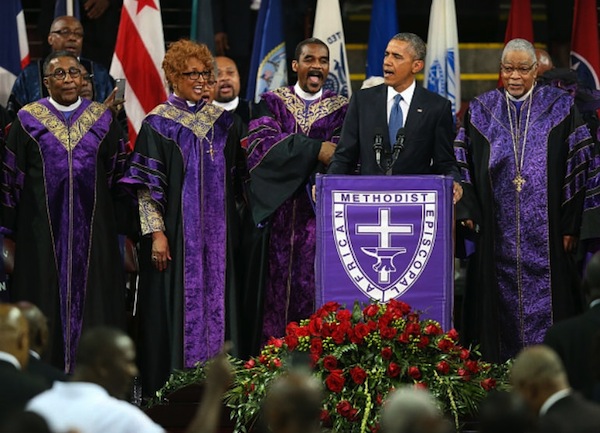People up against it find ways of expressing our common humanity [7 July 2015 | Peter Boyer]
There’s a connection between the death of a football coach in Adelaide and racist shootings in a South Carolina church, and despite the deep tragedy of both events it’s all positive.

Obama’s “Amazing Grace” moment at a sports stadium in Charleston, South Carolina last week. PHOTO MUSICTIMES
After Friday night’s AFL match, the usual knock-em-down spectacle, came an unexpected and moving cameo. Each player put an arm around opponents and stood in a silent circle in memory of Phil Walsh. The ceremony was repeated in subsequent AFL games.
The funeral of Pastor Clementa Pinckney, gunned down with eight others in his Charleston church last month, saw bonding in a totally different context when people stood and sang in unison led by none other than their country’s president, Barak Obama.
Obama’s theme was grace: the grace shown by families of those killed who forgave the young killer, the grace visited by God which “has allowed us to see where we’ve been blind… to the way past injustices continue to shape the present”. We’re all sinners, said Obama. Near the end came the astonishing sight and sound of a president singing, quickly joined by the congregation in the first verse of “Amazing Grace”: a powerful and deeply moving moment.
The religious notions of sin and redemption have not in the past resonated strongly with me. I have always treasured the self-confidence and public institutions of Australia’s secular public life and I remain strongly opposed to any intrusion of religion into the political realm.
When I began writing about climate change, the secular, utterly rational scientific approach seemed the only possible way to look at the issue. But over time, I’ve shifted. I still see science as central, but the huge size and the moral dimensions of the problems we face mean that it must share the platform with human behaviour and psychology – how we receive and respond to the science – and with people’s religious beliefs.
Two recent books have greatly informed my thinking on this: Don’t even think about it by the English environmental thinker George Marshall, and The righteous mind by Jonathan Haidt, a US psychologist and ethicist.
The subtitle of Marshall’s book is “Why our brains are wired to ignore climate change”, a subject he teases out in 42 tightly-argued chapters under evocative headings like “why polar bears make it harder to accept climate change” and “how science becomes infected with social meaning”.
One chapter, “the phony division between science and religion”, looks at “the minefield that lies between those who regard anthropogenic climate change as an irrefutable scientific fact and those who see it as an ideologically driven belief.”
The division between science and religion is a false one, says Marshall. “People of religious faith have understood all along that there is actually no dividing line between the rational and the emotional brains, but rather a conversation between the two.”
Haidt’s book, subtitled “Why good people are divided by politics and religion”, takes up the story. Moral judgments, says Haidt, come not from our reasoning but our gut instincts. That’s why much of the rational debate about right and wrong – and climate change – is futile.
Haidt’s study benefits from an open view of the world. A long stay in India’s “sex-segregated, hierarchically stratified, devoutly religious society” taught him to approach it on its own terms. In doing so he discovered some profound truths about his own culture.
Just one-seventh of humanity lives in rich countries. These “western, educated, industrialised, rich and democratic” peoples (acronym: WEIRD) are very different from the other six-sevenths.
Whereas most of the world’s people think in group and relationship terms and focus on the needs of their community, says Haidt, westerners think as individuals, separating things out and focusing on personal rights.
That’s given us great things like science, but it’s also fostered division when climate action requires people to work together. It’s no accident that most of the acrimony about it occurs in the West.
Haidt shows that morality lies deep in the psyche of everyone. We may all be sinners, but most of us want good to happen – and that includes those with contrary views about climate change.
The footballers’ circle and the multi-faith gathering at the Pinkney funeral, each in its own way, showed people coming together and accepting their common humanity, something that’s been notably absent from the climate discourse in Australia.
Last month’s papal encyclical has put the health of the planet firmly on the world religious agenda. If the kind of collective power seen at the MCG and at Pastor Pinckney’s funeral could be utilised for this noble cause, who knows what’s possible?
